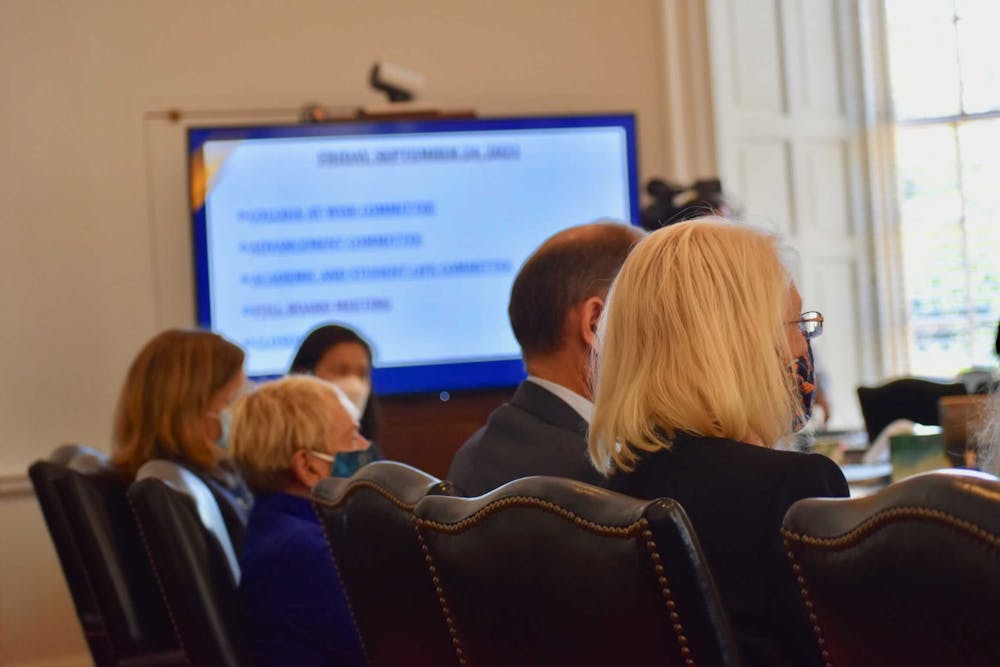The Audit, Compliance and Risk Committee held its first meeting Thursday to discuss the Annual Compliance Report, as well as to evaluate changes made to safety and security since the events of Aug. 11 and 12, 2017. The Board of Visitors’ U.Va. Wise Committee met the following morning to discuss bylaw revisions for the College and heard updates from representatives on plans for increased enrollment and outreach.
The Audit, Compliance and Risk Committee inspects University accounts as well as evaluating operational, financial, strategic and reputational risks for the academic divisions and medical center.
According to Timothy Longo, associate vice president for safety and security and chief of police, the events of August 11 and 12, 2017 revealed gaps in the University’s safety and security system.
White supremacists gathered and marched down the Lawn Aug. 11 brandishing torches and shouting racist, anti-semetic and homophobic chants to protest the removal of the Robert E. Lee statue from Emancipation Park. The next day, the “Unite the Right” protest turned violent and white supremacist James Fields drove a car through a crowd of counter protesters, injuring 19 and killing local resident Heather Heyer.
Following the events, a report prepared by attorney Tim Heaphy characterized the University Police Department’s response the evening of Aug. 11 as “woefully inadequate.”
“University officials were aware of this event for hours before it began but took no action to enforce separation between groups or otherwise prevent violence,” the report reads. “They were unprepared when hundreds of white nationalists walked through the University grounds and surrounded a small group of counter-protesters at the base of a statue of Thomas Jefferson next to the Rotunda.”
The events prompted a number of changes, including stricter enforcement of the ban on open flames on the Lawn and classifying the Lawn as a facility, so as to prevent the open carrying of firearms.
“What we found along the way was that things were broken, systems got broken, communication was broken, integration was broken,” Longo said during the meeting. “And I think it's important to remember that that's how this [change to the safety and security system] came about.”
In September 2017, the University hired Margolis Healy, a professional services firm specializing in safety, security, emergency preparedness and regulatory compliance, to evaluate the University’s safety and security program and processes. Following their evaluation, their recommendations were reported to the Board in December 2017.
Following Healy’s recommendations, the University put a lieutenant in charge of community engagement and hired a student and community engagement person in addition to a diversity officer.
Students and community members alike were critical of the way the city and University handled the rally. A leaked City Council memo admitted that “all hands were, or should have been, on deck.” The memo described concerns about police inaction, insufficient security and City communications’ failure to keep the community informed.
Gary Nimax, assistant vice president for compliance, also discussed the Institutional Compliance Annual Report. This year’s report focused on hotline management processes — more specifically the current reporting mechanisms in place and ways to improve.
One of these mechanisms is SafeGrounds, the in-house management system for reports of noncompliance across the University. SafeGrounds helped optimize the reporting process and organize information-related reports from around the University.
In addition to SafeGrounds, the compliance team also established a Compliance Resource Center at the University. Similar to SafeGrounds, the CRC helps ease the process for reporting for reporters, and also simplifies the process for staff and faculty.
“It simplifies the process for faculty, staff and students because they don't have to worry so much about getting into the right office,” Nimax said.
At the U.Va. Wise Committee meeting, Committee Chair Mark T. Bowles and Donna Price Henry, Chancellor of the College at Wise, brought forward multiple revisions to the College at Wise Advisory Board’s bylaws — including changing the required quorum for the College at Wise’s Board to a simple majority. .
The updates to the bylaws passed.
Jeffrey Baylor, the College at Wise vice chancellor for enrollment management, then presented a report on plans to increase enrollment. In September, the College switched to an online platform to manage admission and enrollment information, a change Baylor had endorsed.
“It needs to be faster, it needs to be cleaner, it needs to be easier from the student perspective,” Baylor said. “This all should be automated.”
The digital platform provides prospective students a place to check on their admission status and for faculty to share marketing and communications with prospective students — it also includes automated chatbots to answer students’ questions.
Other plans for increasing the College at Wise’s enrollment include a recent move to eliminate application fees for all students and outreach to local counties’ schools to provide better education to the Appalachian area the school serves.
Henry went over plans for employee retention and was optimistic about the fact that enrollment numbers at the College have held steady over the past few years.
Finally, Henry presented the 22nd annual Crockett Award, given to an individual who has made significant contributions toward strengthening the relationship between the University and the College at Wise. Citing his work with the College at Wise, including full tuition scholarships for low-income students and dedication to the school, Henry presented the award to University President Jim Ryan.
“It has been among the most fulfilling work that I've had the pleasure to be involved in since becoming president,” Ryan said. “Wise is an unbelievable, special place and all of us are privileged to be a part of that.”
The next set of Board meetings will be held Dec. 8 and 9.







